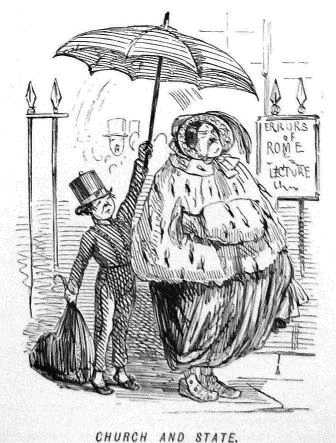
It's OK not to believe!
Secular Humanist Society Gibraltar

SEPARATING CHURCH & STATE
In Gibraltar we have the benefit of being part of a diverse and multi-cultural society which embraces people of different backgrounds who hold different beliefs and faiths (or none). Here in the SHSG we are strong advocates of the separation of church and state. In a nut-shell, this means that we think our society is best served by the government holding a neutral position with respect to different religions (inc. none). In practice, this would entail a ‘freedom of religion’ as well as a ‘freedom from religion’ stance which would allow the religious to practice their religion without any interference from the government, as long as the practices do not infringe upon the rights of others.
It would also allow the non-religious to live in a society without the imposition of religion on things like law, education and health. Accordingly, this philosophy of government is not only favoured by the non-religious but by many religious folk alike. Due to historical reasons, most governments around the world have religious underpinnings and are not completely secular. However, we are firmly of the view that to promote a modern society of equality, where the minority’s rights are not trampled on by the majority’s opinion, a secular government with a firm stance on the separation of church and state is the way forward and will provide a better present and future for our society. People who are committed to human rights as basic values, like all humanists, most non-religious and many religious people, have to accept difference.
Many give legal privileges to churches, including those that have ‘concordats’ with the Vatican – these are international treaties that are outside the control of national parliaments and typically give special privileges to the Roman Catholic church.
Sadly in Europe today very many states are not secular, and even those that claim it often fail in practice. In one way or another they favour religion, usually one particular Christian church. Many states have an established church; many hand over public money to one or more churches or religions or else provide public facilities and legal backing for the collection of taxes from church members. Many give legal privileges to churches, including those that have ‘concordats’ with the Vatican – these are international treaties that are outside the control of national parliaments and typically give special privileges to the Roman Catholic church.
Neutrality or secularism usually means that the state does not provide any privileges to lifestance organisations, whether religious or not, but a few states seek to remain neutral while (in theory) giving a special position to all such organisations. Examples are Belgium and the Netherlands (where humanist or laique organisations are treated in the same way as religious organisations). In practice, however, this approach favours the traditional churches and helps maintain them even as they lose support while being slow to recognise changing patterns of belief.
Here are a few examples of states that fail to observe the principles of secularism:
As is often the way, although clearly stated in the constitution, all too often the entrenched beliefs and personal values of the individual can seep into the very protectors of that constitution and we find religious privilege being handed out like jobs for the boys, with the clergy and their so called 'flock' hiding behind these privileges and attempting to gain pecuniary advantage over others based solely on the archaic notion that religion should not be questioned and should be afforded whatever is asked in it's name.
Source: http://politicsreligion.eu/

We have to live communally with those who have different beliefs and lifestances or world-views.Some are religious, some not. We have to respect the right of everyone to choose and hold a belief (though that does not mean we have to respect the beliefs themselves, some of which deserve little respect and much criticism). We also have to respect their right to ‘manifest’ it – to put it into practice – though the European Convention on Human Rights allows some exceptions where (for example) the rights of others are affected.
This all has serious implications for society. It means that the state and its laws, institutions and administration must not take sides – must not favour one belief and disadvantage others. Otherwise it will privilege those holding the favoured belief and infringe the human rights of everyone else. This is the principle of separation of church and state, of religion and politics. The state needs to be neutral – in other words, secular. (In this context ‘secular’ has no connotation of being against religion, and many religious believers support the principle of secularism, which originated in the late middle ages in moves by the church to fend off royal interference with internal church affairs.)
Sadly in Europe today very many states are not secular, and even those that claim it often fail in practice. In one way or another they favour religion, usually one particular Christian church. Many states have an established church; many hand over public money to one or more churches or religions or else provide public facilities and legal backing for the collection of taxes from church members.
1. that the voices of the religious (or equally of the non-religious) have no privileged status and;
2. that arguments based simply on religious doctrine – rather than on considerations comprehensible by the whole community – carry no weight.
This is an obligation on politicians more than on individual citizens, but it is necessary for all to be vigilant that public decision-making is not subverted by religious considerations at the cost of the rights and freedoms of others. It is of paramount importance to ensure a balanced society with a smoothly oiled democratic process that state & religion are firmly kept well apart, as the Gibraltar constitution clearly decrees:
Gibraltar Constitution Order 2006 Protection of freedom of conscience.
(1) Except with his own consent, no person shall be hindered in the enjoyment of his freedom of conscience, and for the purposes of this section the said freedom includes freedom of thought and of religion, freedom to change his religion or belief, and freedom, either alone or in community with others and both in public and in private, to manifest and propagate his religion or belief in worship, teaching, practice and observance.
(2) Except with his own consent (or, if he is a minor as prescribed by law, with the consent of his guardian), no person attending any place of education shall be required to receive religious instruction or to take part in or attend any religious ceremony or observance if that instruction, ceremony or observance relates to a religion that he does not profess.
(3) No religious community or denomination shall be prevented from or hindered in making provision for the giving, by persons lawfully in Gibraltar, of religious instruction to persons of that community or denomination in the course of any education provided by that community or denomination.
(4) No person shall be compelled to take any oath that is contrary to his religion or belief or to take any oath in a manner that is contrary to his religion or belief.
(5) Nothing contained in or done under the authority of any law shall be held to be inconsistent with or in contravention of subsection (1) or (3) to the extent that the law in question makes provision – (a) in the interests of defence, public safety, public order, public morality or public health; or (b) for the purpose of protecting the rights and freedoms of other persons, including the right to observe and practise any religion or belief without the unsolicited intervention of persons professing any other religion or belief, except so far as that provision or, as the case may be, the thing done under the authority thereof is shown not to be reasonably justifiable in a democratic society.
(6) References in this section to a religion shall be construed as including references to a religious denomination and cognate expressions shall be construed accordingly.
- The United Kingdom – gives 26 seats in the upper house of its Parliament to bishops of the established church.
- Greece pays for the training, salaries and pensions of Greek Orthodox clergy and for their church buildings.
- Denmark has an established church that receives Government grants worth about €100mn. pa. In addition its members (80% of population) have to pay a church tax.
- Finland gives its Evangelical-Lutheran Church of Finland gets 1.63% of the proceeds of corporation tax. In addition the members of its two established churches have to pay a
church tax with their income tax.
- In France, despite its boasted separation of church and state, churches built before 1905 are owned and maintained by the state at a cost of about €100 mn pa, and local authorities provide housing for priests at a cost of over €50 mn pa.
- In Germany, recognised churches levy a tax on their members which is collected with federal income tax; and individual Lander have similar arrangements – these taxes produce about 80% of church income.
- Iceland has a compulsory church tax that taxpayers can assign to any registered religion – but humanists are not allowed to register as a ‘religion or belief’ and their tax is assigned to the university.
- In Italy 0.8% of income tax goes to registered religions or to the state as nominated by each individual taxpayer – but 60% of taxpayers indicate no preference and their tax is divided up in the proportions indicated by the 40% who do – as a result the Roman Catholic Church gets 87% of that 8% of income tax.
- In many states, including Austria, Belgium, France, Germany, Ireland, Luxembourg, Malta, the Netherlands, Slovakia and the United Kingdom, church schools committed to a particular religion are subsidised – often at a very high rate – from public funds.
- Some states pay for priests to teach religious instruction in public schools – for example, Austria, Italy, Poland and Spain.
- A large majority of states require religious education or instruction to be given in public schools, usually with a distinct bias towards Christianity (sometimes a particular church) or else towards religion as opposed to non-religious lifestances.
- States with concordats with the Vatican include Austria, France (for Alsace Lorraine), Germany, Italy, Latvia, Lithuania, Luxembourg (the 1801 concordat with France), Malta, Poland, Portugal, Slovenia and Spain. Some of these are important, some of less significance.
- Some states allow churches to conduct legally valid marriages – for example, Cyprus, the Czech Republic, Italy, Lithuania, Portugal, Slovakia, Sweden, United Kingdom.
For example, in the United Kingdom, about 80% of people (including 80% of religious believers) want a law to legalise assisted dying for the terminally ill. The churches are strongly opposed, however, and there is no early prospect of reform. Similarly, many states have restrictive laws on matters such as abortion, divorce and contraception owing to political unwillingness to provoke the churches, even when the majority of the public wants reform. Separation of church and state would see an end to all these practices.
However, separation of church and state does not mean that religious people are barred from the public square. Every individual citizen retains his or her right to participate in public debate and to advocate policies, whether they are inspired by religion or not. Religious organisations likewise have freedom of speech and can publish their own views. What is vital is;

